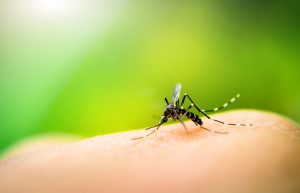
Spring is here, and while we’re all excited to spend more time outdoors, there’s a growing problem we need to watch out for: expanding mosquito zones. As temperatures rise, mosquitoes are spreading into new areas, and your backyard might not be as safe as it once was. These pesky insects aren’t just annoying—they can carry diseases that pose risks to your family and pets.
With their range increasing, it’s more important than ever to protect your outdoor space. Whether you’re enjoying a BBQ or just relaxing on the porch, keeping mosquitoes at bay is becoming a bigger challenge. But don’t worry—there are ways to stay ahead of the swarm and make your backyard a more comfortable, safer place this spring.
How does climate change influence the spread of mosquito zones?
Climate change significantly influences mosquito zone spread by altering favorable environmental conditions for mosquito breeding and survival. Here’s how climate change is driving the expansion of mosquito populations:
- Warmer Temperatures: Mosquitoes thrive in warm climates, and as global temperatures rise, regions that were once too cold for certain species are becoming more hospitable. Higher temperatures speed up mosquito breeding cycles and increase activity levels, allowing populations to grow and spread into new areas.
- Increased Rainfall: Climate change has led to unpredictable weather patterns, including more frequent and intense rainfall. Standing water, such as in puddles, ponds, and clogged gutters, is a prime breeding ground for mosquitoes. With more rain, there are more potential breeding sites, leading to an increase in mosquito populations.
- Longer Growing Seasons: Warmer winters and longer growing seasons allow mosquitoes to extend their reproductive period. As a result, they have more time to breed, leading to larger populations in the spring and summer months, which expands their range.
- Shifting Habitats: As temperatures increase, mosquitoes migrate to higher altitudes and previously inhospitable latitudes. This habitat shift allows mosquito species to establish populations where they were once absent, expanding their zones.
- Altered Disease Transmission: Warmer temperatures and extended seasons also impact the transmission of mosquito-borne diseases, such as West Nile virus, malaria, and Zika. Longer mosquito activity periods can increase the spread of these diseases to new areas, heightening public health risks.
Climate change is creating ideal conditions for mosquitoes to thrive in new areas, contributing to the spread of mosquito zones and increasing the potential for disease transmission.
What are the health concerns linked to expanding mosquito regions?
The expansion of mosquito regions due to climate change raises several health concerns, as mosquitoes are carriers of various diseases that can affect humans and animals. Here’s how the growing mosquito populations pose health risks:
- Increased Disease Transmission: Mosquitoes are vectors for several serious diseases, including West Nile virus, Zika virus, malaria, and dengue fever. As mosquito zones expand, the transmission of these diseases becomes more widespread, especially in regions where these illnesses were previously rare or absent.
- Higher Risk for Vulnerable Populations: Young children, elderly individuals, and people with weakened immune systems are more susceptible to mosquito-borne diseases. As mosquito populations grow, these vulnerable groups are at higher risk for complications, such as severe illness or even death, particularly in areas with limited access to healthcare.
- Wider Geographic Spread of Diseases: Climate change allows mosquitoes to migrate into new territories, which may increase the risk of outbreaks in areas that were once considered safe from certain diseases. This can strain local healthcare systems and cause public health challenges.
- Impact on Animal Health: Mosquitoes can also affect animals, particularly in regions where mosquitoes transmit diseases like heartworm. This can lead to widespread health issues in pets and wildlife.
- Increased Healthcare Costs: The rise in mosquito-borne diseases leads to higher healthcare costs for prevention, treatment, and disease management, burdening healthcare systems and economies.
Expanding mosquito regions pose significant public health concerns. It increases the risk of disease transmission, affects vulnerable populations, and strains healthcare resources.
Which areas are seeing a rise in mosquito populations this spring?
Several regions are experiencing a notable rise in mosquito populations this spring due to warmer temperatures, increased rainfall, and other climate-related factors. Here are some areas where mosquito activity is on the rise:
- Fraser Valley, British Columbia, Canada: After record-low river levels in 2024, the region anticipates a significant increase in mosquito populations this spring. Mosquito eggs that would have hatched last year are expected to contribute to this year’s pest problems.
- Grand Strand and Pee Dee, South Carolina: Warm, wet conditions have extended mosquito activity in these areas. The combination of higher temperatures and increased rainfall has created favorable breeding grounds, leading to a longer mosquito season.
- Eaton Fire Burn Area, California: Approximately 2,700 swimming pools in and around the Eaton fire burn zone could become breeding grounds for mosquitoes as the weather warms up. Untended pools and other standing water attract mosquitoes, raising concerns about potential disease transmission.
- Delaware, USA: The Delaware Department of Natural Resources and Environmental Control (DNREC) has initiated its annual spring mosquito control campaign in southern Sussex County and plans to expand across Kent and New Castle counties. This proactive measure aims to manage mosquito populations before they become a nuisance.
These regions highlight the broader trend of expanding mosquito zones influenced by climate change. Warmer temperatures and increased rainfall create ideal mosquito breeding conditions, leading to earlier and more widespread infestations. Residents in these areas are advised to take preventive measures, such as eliminating standing water and using repellents, to protect themselves from mosquito-borne diseases.
How do expanding mosquito zones affect outdoor living spaces?
Expanding mosquito zones significantly affects outdoor living spaces, making it more challenging to enjoy outdoor activities without the discomfort and risks associated with mosquitoes. Here’s how:
- Increased Mosquito Activity: As mosquito zones grow, outdoor areas such as patios, gardens, and backyards become more inviting to these pests. The rise in mosquito populations can make spending time outdoors unpleasant, leading to more bites and discomfort, especially during peak mosquito activity in the early morning and evening.
- Health Risks: Mosquitoes are vectors for diseases like West Nile virus, Zika, and malaria. As mosquito populations spread, the risk of these diseases increases, which can impact individuals enjoying outdoor spaces. Families and pet owners may be particularly concerned about the health of their children and pets, as they are often more vulnerable to mosquito-borne illnesses.
- Disrupted Outdoor Activities: Mosquitoes often ruin social gatherings, barbecues, and family events. People may avoid using their outdoor living spaces, reducing the enjoyment and functionality of these areas. Mosquitoes can discourage outdoor exercise and relaxation, such as yoga or gardening.
- Increased Use of Repellents: With more mosquitoes around, people rely heavily on chemical repellents, candles, or bug sprays, which can be inconvenient and irritating. Relying on these products can also affect the natural ambiance of outdoor spaces, making them less inviting.
Expanding mosquito zones compromise the enjoyment, safety, and functionality of outdoor living spaces, requiring homeowners to take extra precautions to protect themselves and their environments.
Protect Your Backyard: Manage Expanding Mosquito Zones This Spring!
As mosquito zones expand due to warmer weather, these pests become more active and harder to control. Their presence can disrupt outdoor activities, bring health risks, and make your backyard less enjoyable. Our expert team is here to help by providing effective mosquito control solutions, including eliminating breeding grounds and treating problem areas.
Don’t let mosquitoes take over your outdoor spaces this spring. Contact Freedom Pest Services today for a comprehensive mosquito control plan and reclaim your backyard for family fun and relaxation!
